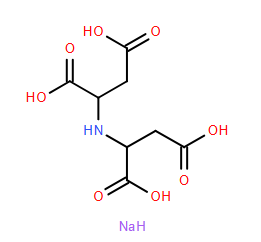
Iminodisuccinate Sodium Salt (IDS): The Gentle Powerhouse of Green Chelation
Introduction: Embracing Sustainable Chemistry
In an era increasingly defined by environmental responsibility, chemistry is undergoing a quiet revolution. At the forefront of this shift towards greener alternatives stands Iminodisuccinate Sodium Salt (IDS), a versatile and biodegradable chelating agent offering a powerful yet eco-conscious solution where traditional options fall short. Innovators like YuanlianChem recognize the profound potential of molecules like IDS, dedicating expertise to their development and application, helping industries transition towards safer, more sustainable practices.
1. What is Iminodisuccinate Sodium Salt?
Iminodisuccinate Sodium Salt, commonly abbreviated as IDS, is a fully organic, readily biodegradable chelating agent. Chemically, it belongs to the class of amino polycarboxylates. Its structure features a central nitrogen atom connected to two succinic acid moieties, each neutralized with sodium ions (hence "sodium salt"). This specific arrangement creates multiple binding sites, enabling it to effectively sequester and deactivate metal ions in solution.
2. Names and Identifiers:
-
Common Name: Iminodisuccinate Sodium Salt
-
Abbreviation: IDS
-
CAS Number: 144538-83-0
-
Synonyms: Tetrasodium Iminodisuccinate; Sodium Iminodisuccinate; IDS-4Na

3. Key Properties & Characteristics:
IDS distinguishes itself through a unique combination of functional and environmental properties:
-
Exceptional Chelating Power: Effectively binds a wide range of di- and trivalent metal ions like Calcium (Ca²⁺), Magnesium (Mg²⁺), Iron (Fe²⁺/Fe³⁺), Copper (Cu²⁺), and Manganese (Mn²⁺), preventing them from causing unwanted precipitation (scaling) or catalytic degradation.
-
Outstanding Biodegradability: This is IDS's hallmark. It readily breaks down in the environment via recognized pathways (ultimately to water, CO₂, and biomass), meeting stringent criteria like the OECD 301 standards. This contrasts sharply with persistent chelators like EDTA.
-
Low Aquatic Toxicity: Demonstrates significantly lower toxicity to aquatic organisms compared to many conventional chelating agents.
-
High Water Solubility: Easily dissolves in water, facilitating its use in various aqueous formulations.
-
Good Stability: Remains effective across a broad pH range and under moderate temperature conditions encountered in many applications.
-
Phosphate-Free: Does not contribute to eutrophication, making it an environmentally preferable choice.
4. Diverse Applications:
The unique profile of IDS makes it invaluable across numerous sectors:
-
Detergents & Cleaning Products: A cornerstone application. IDS softens water by binding hardness ions (Ca²⁺, Mg²⁺), boosting surfactant efficiency, preventing scale on fabrics and appliances, and stabilizing bleaches. Its biodegradability is crucial for down-the-drain products, a key focus for YuanlianChem in developing next-generation cleaning solutions.

-
Water Treatment: Controls scale formation in boilers, cooling towers, and reverse osmosis membranes. Its biodegradability minimizes long-term environmental impact in discharged water.
-
Agriculture: Used in micronutrient fertilizers to keep essential metals like iron, zinc, and manganese soluble and bioavailable for plant uptake, enhancing fertilizer efficiency.
-
Pulp & Paper: Chelates metal ions that can catalyze peroxide decomposition during bleaching processes, improving bleaching efficiency and pulp brightness.
-
Textile Processing: Prevents metal ion interference in dyeing and bleaching baths, ensuring consistent color quality and fabric treatment.
-
Personal Care: Found in some formulations (like shampoos and soaps) to stabilize products and counteract water hardness effects.
-
Industrial Cleaning & Metal Surface Treatment: Controls scale and removes metal ions during cleaning processes without the environmental burden of older chelators.
5. Environmental & Safety Profile:
The environmental and safety advantages of IDS are central to its value proposition:
-
Environmental Fate: Its rapid and ultimate biodegradability under aerobic conditions is its most significant environmental benefit. It does not persist or bioaccumulate.
-
Toxicity: Classified as low in toxicity via oral, dermal, and inhalation routes. It exhibits low irritation potential. Its low ecotoxicity, especially compared to EDTA or NTA, makes it a preferred choice for environmentally sensitive applications.
-
Regulatory Status: Generally well-regarded by environmental agencies (like the US EPA and EU authorities) due to its favorable biodegradation and toxicity profile. It is listed on inventories like EINECS.
-
Sustainable Choice: IDS is a prime example of Green Chemistry principles in action – effective, designed for reduced environmental impact from the start. Companies committed to sustainability, such as YuanlianChem, actively promote and supply IDS as part of their portfolio for responsible chemical solutions.
6. Storage Recommendations:
To maintain IDS quality and performance:
-
Store in a cool, dry, and well-ventilated place.
-
Keep the container tightly closed when not in use to prevent moisture absorption and contamination.
-
Avoid exposure to extreme heat (above 40°C/104°F is generally not recommended for prolonged periods) or direct sunlight.
-
Store away from strong oxidizing agents and acids.
-
Observe standard good chemical handling practices. While IDS has low acute toxicity, dust generation should be minimized, and appropriate PPE (safety glasses, gloves) should be used during handling.
Conclusion: IDS – A Cornerstone of Sustainable Chemistry
Iminodisuccinate Sodium Salt (IDS) represents more than just a functional chemical; it embodies the practical realization of sustainable chemistry. Its powerful chelating ability, combined with its outstanding biodegradability and low eco-toxicity, offers industries a responsible alternative to persistent chelating agents. From keeping our clothes clean and our water systems scale-free to enhancing agricultural yields and industrial processes, IDS delivers performance without compromising the environment. As demand for greener solutions continues to surge, IDS is poised to play an increasingly vital role. Forward-thinking suppliers like YuanlianChem, with their commitment to innovation and environmental stewardship, are instrumental in making this high-performing, planet-friendly chelator readily available, empowering industries to operate cleaner and more sustainably for the future.
Yuanlian Chemical specializes in the production of polyaspartic acid (PASP),tetrasodium iminodisuccinate(IDS), GLDA, MGDA etc. with stable quality and excellent quantity!





Contact us